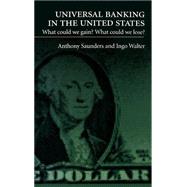Universal Banking in the United States What Could We Gain? What Could We Lose?
, by Saunders, Anthony; Walter, Ingo- ISBN: 9780195080698 | 0195080696
- Cover: Hardcover
- Copyright: 1/6/1994
In 1933 and 1956, the United States sharply limited the kinds of securities activities, commercial activities, and insurance activities banks could engage in. The regulations imposed on banks back then remain in place despite profound changes in the economic environment, in the structure of the national and international financial markets, and in technology. In this span of time many industries, especially those confronting global competition, have transformed themselves dramatically in their efforts to survive and prosper. Not so in the American financial services sector, banks have largely remained stuck in an antiquated regulatory structure which has placed the burden of responding to the needs of market-driven structural change on the shoulders of the regulators and the courts in a constant search for loopholes in the law. The purpose of this book is to evaluate the case for and against eliminating the barriers that have so long existed between banking and other types of financial services in the United States. Universal Banking in the United States studies the consequences of bank regulation in the U.S. as it relates to competition in international financial markets. Anthony Saunders and Ingo Walter examine universal banking systems in other countries, especially Germany, Switzerland, and the U.K., and how they work. They then apply the lessons to U.S. banking, paying particular attention to the benchmarks of stability, equity, efficiency, and competitiveness against which the performance of national financial systems should be measured. In the end, the authors propose the outlines of a level playing field on which any number of forms of organization can grow in the financial services sector, in which universal banking is one of the permitted structures, and where regulation is linked to function.







